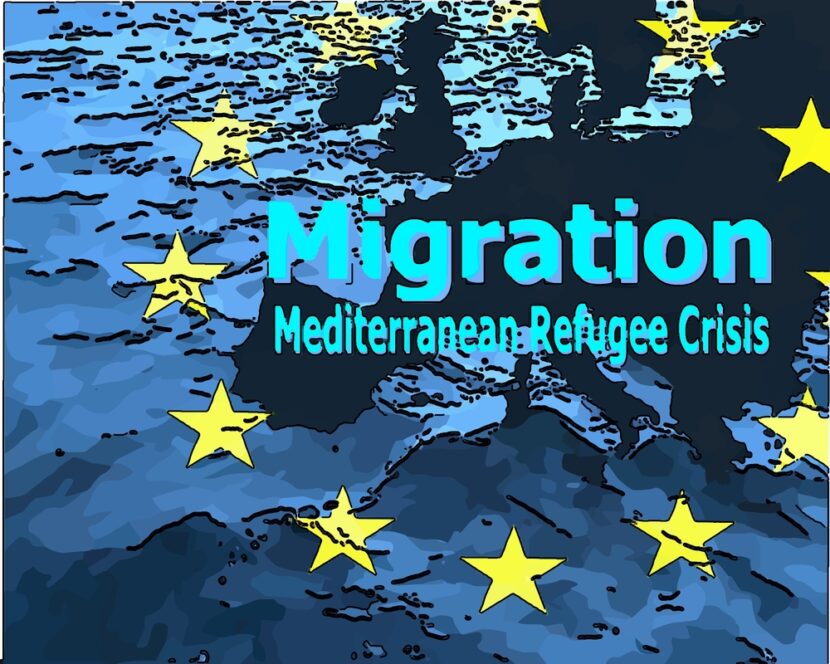MOLYVOS, Greece – On the waterfront beneath this village of stone houses cascading down a castle-topped hill, two worlds collide. Tourists saunter along the pier, gazing at the fishing boats bobbing in the harbour. A group of Afghan children who risked their lives to get here on an overloaded dinghy play in the shallow water.
Greece’s island of Lesbos, a popular holiday destination for Europeans and Greeks alike, has found itself at the centre of a migration crisis. Tens of thousands of people from the Middle East, Africa and parts of Asia have travelled to the country’s eastern Aegean islands this year, using them as a gateway to mainland Greece and from there northward to new lives in more prosperous European Union countries.
“It is very sad. It goes through my heart for those people and the children who are hungry,” said Dutch tourist Marianna Kuipers. “On the other hand, it’s my vacation and that’s not nice to see.”
The refugees “need help very quickly,” she said, before wading into the water to talk to the young Afghans.
Tourism is just about the only industry doing well as Greece reels from a vicious financial crisis, and locals and officials are worried about what will happen if the arrivals continue to increase.
“There are hundreds of people arriving every day. Soon it won’t be manageable,” said Periklis Antoniou, the head of the Lesvos Hoteliers Association, which uses an alternative spelling for the island’s name. He said that while few tourists are complaining, and some are even helping the refugees, immediate measures are needed.
“The summer will pass and the damage to the country will be huge,” he warned.
So far this year, nearly half of the 55,000 migrants who have reached Greece by sea from Turkey have arrived in Lesbos, Greece’s third-largest island. More than 25,000 have landed along its northern and eastern coastline, a staggering 620 per cent increase over the number that had arrived at this point last year, according to the island’s coast guard. In all of 2014, it said, 11,000 migrants landed on Lesbos.
From there, they head to the mainland. Last week, about 2,000 boarded ferries for the mainland with papers allowing them to remain in Greece for up to six months. Most are trying to make their way to more prosperous EU countries, heading overland by foot across Greece’s northern border into Macedonia or trying to sneak onto Italy-bound ferries from western Greek ports.
Lesbos’ mayor, who has set up a refugee camp and appealed directly to the European Union for help, said the impact on tourism has so far been limited. Spyros Galinos noted that the port area is no longer full of migrants and ripped up inflatable dinghies.
“Today the cruise ship came. The port is clean. It has order and it can receive these visitors,” he said last week. “The blows we could have sustained so far we have managed to avoid.”
But just a few days later, local media said a cruise ship refused to dock at Lesbos and changed course for the more northern island of Lemnos, citing concerns over the refugee crisis.
Molyvos is one of Lesbos’ top tourist attractions. Located on the island’s northern shore, it is also the closest point to Turkey, making it equally attractive to desperate refugees and migrants from war-ravaged or impoverished countries hoping for a better life in the European Union.
The vast majority of those landing in Lesbos are refugees from Syria, Iraq, Afghanistan and to a smaller degree from some African countries. Many come with their families, with hundreds of children and babies among the arrivals.
“This is a new thing for us. We always had migrants here, but never in these numbers,” said Komninos Kalpakis, taking a break while working at his brother’s fish restaurant on the Molyvos waterfront. “I never imagined we would be rescuing thousands from the sea.”
The businesses in the harbour “haven’t generally been affected by this issue of the migrants,” Kalpakis said. “Most tourists see them with compassion, with a desire to help if they can.”
Not everyone agrees the impact on tourism has been minimal. The main port of Mytilene, which has borne the brunt of the influx, has frequently been packed with refugees sleeping outside while waiting to be processed.
Giorgos Papageorgiou owns a hotel opposite the port’s entrance. He said his clients are usually vacationing Turks who arrive by ferry, and that many have stopped coming.
“We have a big problem. … They’re causing a lot of damage to the hotel because the clients see this situation, they speak of disease, they speak of dirt … and they’re right. And they say they won’t come back to this place again,” he said. “We’re suffering a lot of losses. We have cancellations.”
But back in Molyvos, Dimitris Tekes, who owns a small hotel and bustling cafe near the fish restaurant, said none of his clients have said they’ll stay away because of the situation.
The refugees “have never bothered anyone,” said Tekes, who is also the general secretary of the island’s hoteliers’ association. But, he added, “it would better if the migrants weren’t so visible among the people here.”
There is one thing everyone agrees on: Lesbos cannot cope alone, and desperately needs assistance from the government and from other EU countries, which Greece says must share the burden.
“We have no help from anywhere,” said Antoniou, the hotel association head “They’ve left an island of a few thousand residents to deal with a problem of the whole European Union.”
